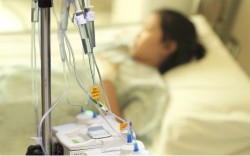
Amphetamine addiction treatment is a long process, especially because symptoms like depression and cravings can last much longer than those associated with other drugs of abuse. But it is important to be aware of the treatment process utilized when a person first comes into amphetamine addiction rehab or is hospitalized for the abuse of these drugs. If you need immediate treatment for amphetamine abuse, call 800-816-1059(Who Answers?).
Amphetamine Overdose and Psychosis
Amphetamine overdose, like other types of stimulant overdose, can be deadly. When an individual is first brought into addiction treatment, medical professionals usually check to make sure the patient isn’t showing signs of overdose, which according to the National Library of Medicine, include:
- Restlessness
- Confusion
- Aggression
- Panic
- Hallucinations
- Fast breathing
- Shaking
- Fever
- Dark red urine
- Fast or irregular heartbeat
- Dizziness
- Diarrhea
- Seizures
- Coma

The patient may be given sedatives if they are showing signs of aggression.
If the individual is experiencing these signs, they will be restrained if necessary and attended to with medication and other treatments as each symptom begins to show itself.
In addition to overdose, a person who has been abusing amphetamines for a long time can experience a type of psychosis that is caused by the drug, leading to many of the same issues, including paranoia, aggression, violent behavior, and hallucinations.
This is why restraints are often used in immediate treatment as well as the administration of benzodiazepines to minimize the individual’s symptoms and sedate them safely.
Those who are intoxicated and in danger of experiencing severe side effects as a result may also be given “activated charcoal and laxative, if the drug was taken by mouth” (NLM).
Testing and Exams
Often, the individual will also be tested for any other substances in their system as well as other issues that will be pertinent to their treatment. The common exams given during immediate amphetamine addiction treatment include:
- Blood tests
- Urine tests
- Chest x-rays
- CT scans
- EKGs
- Poison and toxicology screenings
Amphetamine Withdrawal Treatment
While still a common occurrence, not every individual who arrives in amphetamine addiction rehab is going through overdose or psychosis. Many realize they need help before this point or are sent to a treatment center by their families. However, this does lead to withdrawal once the individual stops taking amphetamines. Amphetamine withdrawal is treated medically in a number of ways:
- The administration of anticraving agents and antidepressants for withdrawal symptoms
- The administration of antipsychotics for any symptoms of psychosis
- Testing for any other substances
Over time, the medically assisted treatment for withdrawal will change, but the physician’s first priority is to stabilize the patient.
Transition into Addiction Rehab
Once the patient becomes more stable and depending on the facility that treated their acute symptoms, they will likely move on to a more long-term recovery program. This will often include the use of behavioral therapies as well as antidepressants and other medications where necessary. Patients must be stabilized and helped through the beginning stages of rehab before they can safely and more effectively begin the treatments that will help them end their amphetamine abuse.
Find Amphetamine Addiction Treatment Now
If you or someone you love is currently experiencing severe symptoms that may put you or someone else in danger, call 911 immediately. To find rehab programs in your area that can allow you to recover from amphetamine abuse and addiction, call 800-816-1059(Who Answers?) now.


